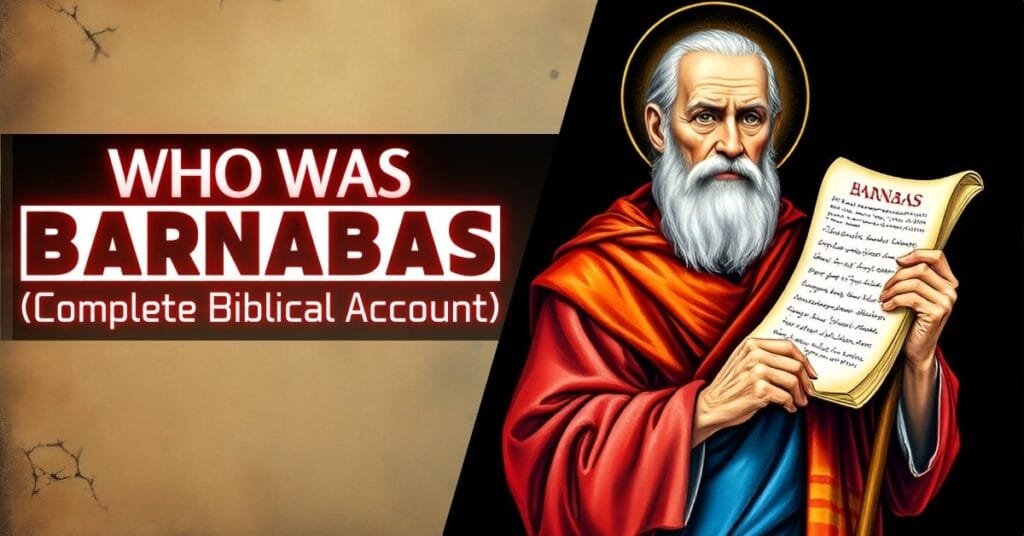Before Jesus ever walked the dusty roads of Galilee, the Jewish people had already developed a deeply rooted understanding of who God is. Their foundation was simple, powerful, and unshakable: there is only one God. This belief shaped their entire world. In the Torah, the most sacred texts of the Jews, God declares in Deuteronomy Chapter 6 Verse 4, “Hear, O Israel: The Lord our God, the Lord is one.” This verse was memorized by children, whispered in daily prayers, and repeated in every synagogue. The Jewish people were not looking for multiple gods, or even a second god. They were waiting for the Messiah—a promised one from God—but they never expected that He would be God Himself.
The prophets had given them glimpses, even if they didn’t fully realize it at the time. Isaiah Chapter 9 Verse 6 speaks of a child who would be born and called “Mighty God, Everlasting Father.” That’s a strong hint, but for many in that time, it wasn’t clear. They were expecting a political leader, a deliverer like Moses or David. So when Jesus arrived, He didn’t fit their picture. He didn’t lead a rebellion against Rome. He didn’t raise a sword. He spoke of the Kingdom of God and forgiveness, and claimed something far more shocking: equality with God.
When Jesus taught, He didn’t say, “Thus says the Lord,” like the prophets did. Instead, He said, “I say to you.” That alone caught attention. But it was His actual words that made religious leaders furious and caused ordinary people to ask serious questions. One day, while speaking to a crowd, Jesus said something no one had dared to say. In John Chapter 8 Verse 58, He declared, “Before Abraham was, I am.” The people knew exactly what He meant. He was not just referencing Abraham, their ancestor, but using the sacred name God gave to Moses at the burning bush in Exodus Chapter 3 Verse 14. There, God said, “I AM WHO I AM.” For Jesus to say “I am” was not just poetry—it was a claim to be God Himself.
The crowd’s reaction says everything. They picked up stones to kill Him. Why? Because in their eyes, He had committed blasphemy. Only God could use that name. And Jesus wasn’t correcting them. He didn’t say, “Wait, you misunderstood me.” He knew exactly what He was saying, and so did they. It was bold. It was dangerous. And it was deliberate.
This wasn’t a one-time event. In John Chapter 10 Verse 30, Jesus said, “I and the Father are one.” The reaction? The Jews picked up stones again. When they challenged Him, Jesus didn’t backtrack. He affirmed it. They told Him plainly in John Chapter 10 Verse 33, “You, a mere man, claim to be God.” Jesus wasn’t confused. He was revealing something that many wouldn’t accept, but was completely true.
The name “I AM” carries weight. When Jesus used it, He wasn’t being poetic or mysterious. He was aligning Himself with the God of the Old Testament—the Creator, the Sustainer, the “I AM.” That’s why in the Gospel of John, Jesus used the “I AM” phrase multiple times. “I am the bread of life,” “I am the light of the world,” “I am the good shepherd,” “I am the resurrection and the life,” “I am the way, the truth, and the life,” and “I am the true vine.” These weren’t random metaphors. They were layered with divine meaning, connected to the identity of God.
Each “I AM” statement points back to the burning bush in Exodus, when Moses asked God for His name. God simply replied, “I AM.” That name spoke of eternal existence, self-sufficiency, and unmatched authority. When Jesus used it, He was not only declaring His nature—He was linking Himself to the voice that spoke from the fire, the one who had sent Moses, the one who parted the Red Sea and gave the law at Sinai.
For the Jewish listeners, this was beyond shocking. They weren’t strangers to people claiming to be prophets or messiahs, but no one had ever made such bold claims as Jesus. No one had ever equated themselves with the I AM. That’s why His words created such a stir. It wasn’t because He was a good teacher or a kind healer. It was because He claimed to be divine.
This is the heart of the question: Did Jesus claim to be God? The answer is not hidden or vague. From His own lips, through His words and actions, He made it unmistakably clear. But He didn’t just say it. He showed it. His miracles backed it. His forgiveness confirmed it. And ultimately, His resurrection proved it.
Jesus didn’t demand people believe blindly. He left trails of truth everywhere He went. When He forgave sins, when He walked on water, when He calmed storms with a word, when He raised the dead, all of it shouted one truth: He is more than a man. He is God with us. The reactions of those who heard Him speak tell us so much. Some fell at His feet and worshiped. Others picked up stones. But everyone knew what He meant.
And still today, the question echoes: Who do you say Jesus is? If He is who He claimed to be—the great I AM—then everything changes. Every part of life, every choice, every hope rests on that answer.
Jesus’ Miracles As Signs of Divine Authority
Throughout His ministry, Jesus didn’t just speak with authority—He acted with it. One of the most compelling aspects of His identity was the way He performed miracles, not as a prophet invoking God’s help, but as someone with power in Himself. These miracles were not just signs of compassion; they were signs of authority. He didn’t ask for permission. He commanded. And things happened.
One day, Jesus was teaching in a crowded house in Capernaum. It was packed—standing room only. Four men couldn’t get their paralyzed friend through the front door, so they climbed the roof, dug through it, and lowered the man down on a mat. Everyone was watching, waiting to see what Jesus would do. But instead of healing him right away, Jesus looked at the man and said, “Son, your sins are forgiven.” The room froze. Forgiven? That wasn’t what they expected. The religious leaders began whispering among themselves, “Why does this man speak like that? He is blaspheming! Who can forgive sins but God alone?” That was the key question. And Jesus knew it.
Then, to prove that He had the authority not just to heal, but to forgive sins, Jesus told the man to get up, take his mat, and walk. And he did. Instantly. The miracle was not just about healing a body—it was about revealing divine authority. That story is found in Mark Chapter 2 Verses 5 to 12. It wasn’t the only time this happened. Again and again, Jesus would do something that showed more than just kindness. It showed power that belonged only to God.
Jesus calmed storms. He didn’t pray for the storm to end. He spoke to it. In Matthew Chapter 8 Verses 23 to 27, His disciples were panicking in a boat as waves crashed and the wind howled. Jesus, meanwhile, was asleep. When they woke Him, terrified for their lives, He simply said, “Peace, be still,” and everything went calm. Not gradually. Not eventually. Instantly. The disciples were amazed. “What kind of man is this?” they asked, “Even the winds and the sea obey him!” Nature obeys no one—except God. Yet the sea listened to Jesus as if it recognized His voice.
This kind of authority was unmatched. He didn’t call on a higher power—He was the higher power. Even demons obeyed Him. In countless encounters, evil spirits would cry out in fear, recognizing Him before people did. They would beg Him not to destroy them, acknowledging Him as the “Holy One of God.” They weren’t confused. They knew exactly who He was.
Perhaps one of the most powerful examples of His divine authority comes when He raised the dead. There are several moments, but one that stands out is the story of Lazarus. His friend had died and had been in the tomb for four days. Everyone thought it was too late. But Jesus walked to the tomb, called Lazarus by name, and the dead man walked out alive. No prophet in Israel had ever done anything like that. No one had ever commanded death and received obedience.
But Jesus’ authority wasn’t only over nature, sickness, demons, or even death. It extended into the spiritual realm in a way that shocked everyone. He forgave sins. This wasn’t symbolic. He didn’t say, “God forgives you.” He said, “I forgive you.” That statement alone flipped everything upside down. In Jewish understanding, only God could forgive sins. Sins were not just mistakes; they were offenses against God Himself. And Jesus, standing there in human flesh, looked at people and forgave them—not on God’s behalf, but as if He were the one offended.
In Luke Chapter 7, there’s a moment that reveals this clearly. A woman known in town as a sinner came to Jesus while He was eating at a Pharisee’s house. She washed His feet with her tears, dried them with her hair, and anointed them with perfume. The religious leaders were disgusted. But Jesus told her, “Your sins are forgiven.” They were stunned. “Who is this,” they asked, “who even forgives sins?” Again, Jesus wasn’t misunderstood. They knew what He was claiming. And He didn’t take it back.
The reactions of the religious leaders in these moments tell us just how radical Jesus’ claims were. They saw them as blasphemy. They understood that Jesus wasn’t just acting as a messenger—He was claiming the role of God Himself. And for them, that was unforgivable. But Jesus didn’t correct them. He didn’t soften His words. He stood in that identity.
What’s even more striking is how people responded to Jesus with worship—and how He accepted it. In Jewish culture, worship was reserved for God alone. Even angels, when worshipped, would say, “Don’t do that—I’m a servant like you.” But Jesus didn’t do that. He received worship without objection.
After Jesus walked on water, calmed the storm, and got into the boat, His disciples worshiped Him, saying, “Truly you are the Son of God” (Matthew Chapter 14 Verse 33). He didn’t rebuke them. He didn’t redirect them. He received it.
There’s another powerful moment in John Chapter 9. Jesus healed a man who had been born blind. After being interrogated and cast out by the religious leaders, the man met Jesus again. Jesus asked if he believed in the Son of Man. The man replied, “Who is he, sir, that I may believe in him?” Jesus said, “You have seen him, and he is the one speaking to you.” The man said, “Lord, I believe,” and he worshiped Him. And again—Jesus accepted it.
This would have been shocking in that culture. People didn’t just go around worshiping others. To accept worship was to place yourself in the position of God. But Jesus didn’t stop them. Why? Because it was true. He is worthy of worship.
Even Thomas, one of His closest disciples, had doubts after the resurrection. He said he wouldn’t believe Jesus was alive unless he could see and touch the wounds. When Jesus appeared and invited him to do exactly that, Thomas fell to his knees and said, “My Lord and my God!” (John Chapter 20 Verse 28). That’s the clearest confession of Jesus’ divinity in the Gospels. And what did Jesus say in response? He affirmed it: “Because you have seen me, you have believed; blessed are those who have not seen and yet have believed.”
Jesus did not hesitate to do things that were only meant for God. He didn’t clarify, distance Himself, or redirect the attention. He received worship, forgave sins, spoke with divine authority, and performed miracles that broke the boundaries of the natural world. His actions matched His words. Every miracle was more than just a display of power—it was a message. A message that He was not just from God, but that He is God.
These moments weren’t isolated incidents. They were consistent patterns in His life. Every time He healed, every time He cast out demons, every time He taught, He was revealing who He really was. Not just a good man. Not just a moral teacher. But the living God in human form.
And those around Him—whether they believed or rejected Him—understood the gravity of what He was doing. The religious leaders plotted to kill Him because they saw clearly what He was claiming. The disciples worshiped Him because they had come to believe what He was revealing. And the people—ordinary men and women—were caught in the middle, seeing a man who spoke to storms, walked on water, cast out demons, raised the dead, forgave sins, and accepted worship.
What kind of man does that? Not just a prophet. Not just a wise teacher. Only one answer makes sense. Only one answer fits the evidence. Jesus was not claiming to be just another servant of God—He was showing that He is God in the flesh, full of grace and truth.



